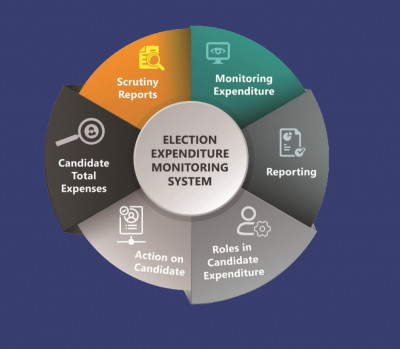The Election Commission of India is the organization that holds the responsibility to foster the process of democracy in the country. It came into existence in 1950 to manage and conduct elections across the country. The EC has three major members, i.e., Chief Election Commissioner and two other election commissioners. The President of India chooses these three members and they remain in office for six years. Given below are the ten most important functions of the EC.

Conducting free and fair elections:
The most important function of EC is conducting free and fair elections, right from the general elections to the legislative assembly elections. Given below is the list of elections that election commission conducts:
- Lok Sabha and Rajya Sabha elections
- State legislative assembly elections
- Parliament and state legislature by-elections
- President and Vice-president elections
Preparing electoral rolls:
The election commission has the responsibility to make sure that the correct electoral rolls are prepared for the elections. A voter who has properly registered to vote in any election should never be left out of that roll.
Staff requisition as necessary:
The EC can request the government for staff requisition from the army or other government offices for smooth election conduction and prevention of malpractices, such as false voting, vote rigging, booth jams, and so on.
Appointment of election observers:
The election commission has the responsibility to get election observers appointed to ensure free and fair elections.
Election schedule planning:
The election commission has the responsibility of planning the election schedule. The chief election commissioner announces the dates through a press conference. The prospective candidates are allowed to file their nominations after the election commission applies the model code of conduct in the areas of the elections.
The Quasi-judicial responsibilities:
The EC also has a couple of quasi-judicial functions like making sure that a model code of conduct is obeyed in the areas of the elections. Also, the EC has to supply its inputs on the cases at the time of elections where any kind of malpractice was involved.
Conducting the by-elections:
The EC holds the responsibility of conducting by-elections in the constituencies when the need arises.
Canceling the elections:
There are a couple of situations where the EC might need to completely cancel polls, such as where there is some kind of malpractice involved or the voting is considered rigged. When something like this happens, the election commission needs to order fresh elections for the area.
Disqualifying candidates:
The body also has the right to disqualify a candidate if that candidate has failed to file his/her election returns to the commission right on time. Also, the EC offers its advice to the President of India to disqualify any MP or MLA in case they are proven guilty of malpractice.
Maintaining a code of conduct:
The election commission has the responsibility to make sure that a code of conduct is maintained during the elections and there is no malpractice.
The Election Commission is a crucial body whose presence ensures free and fair elections across the nation for every vote and every state.

Leave a Reply